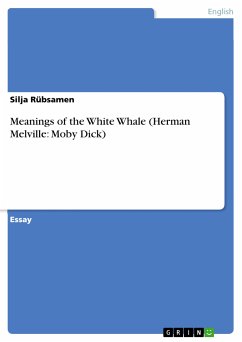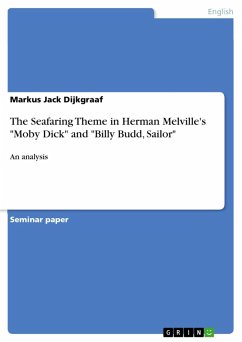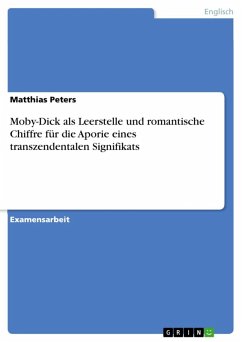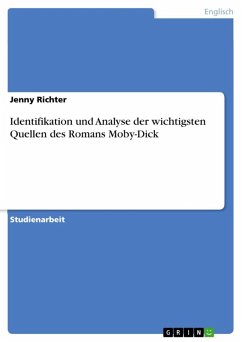
Meanings of the White Whale (Herman Melville: Moby Dick) (eBook, ePUB)

PAYBACK Punkte
0 °P sammeln!
Essay from the year 2002 in the subject American Studies - Literature, grade: A, University of Massachusetts - Dartmouth (English Department), course: English 391 Honors: New England and the Sea, language: English, abstract: Throughout the whole novel Melville undertook great pains to provide a vast network of associations in order to amplify the image of the whale for the reader. A glance at Melville's sources proves that he had amassed a collection of general and mythological accounts of the whale even before he began to write Moby-Dick. Becoming ever more aware of the multiplicity of possib...
Essay from the year 2002 in the subject American Studies - Literature, grade: A, University of Massachusetts - Dartmouth (English Department), course: English 391 Honors: New England and the Sea, language: English, abstract: Throughout the whole novel Melville undertook great pains to provide a vast network of associations in order to amplify the image of the whale for the reader. A glance at Melville's sources proves that he had amassed a collection of general and mythological accounts of the whale even before he began to write Moby-Dick. Becoming ever more aware of the multiplicity of possible interpretations of the whale, Melville admitted in Chapter 104 that the main theme of the book is a "mighty theme," brought to perfection in a "mighty book" (p. 349). Every description of a different concept of the White Whale from any culture brings with it a vast body of pictures and notions, each able to incite a reaction of associations within the reader; the result being necessarily a wide range of different meanings - almost one meaning for every reader. Cloaked in different accounts of the White Whale comes an amplification process. The reader is confronted with concepts of the Whale and his whiteness, each accompanied with a series of possible associations that finally give the White Whale its immeasurable plurality of meaning. That Melville's narrator had undoubtedly more than one meaning in mind for the whale tells Ch. 1: And still deeper the meaning of that story of Narcissus, who because he could not grasp the tormenting, mild image he saw in the fountain, plunged into it and drowned. But that same image we ourselves see in all rivers and oceans. (p. 20) The notion that everybody sees something different in a mirror elucidates the amplification process the narrator has in store for the reader. Just as a mirror, the novel serves as an instrument of self-assessment: the reader looks into the book, and combines personal background with the "raw material" of concepts that enable him to develop his associations that finally form his image of the whale. [...]
Dieser Download kann aus rechtlichen Gründen nur mit Rechnungsadresse in A, B, BG, CY, CZ, D, DK, EW, E, FIN, F, GR, HR, H, IRL, I, LT, L, LR, M, NL, PL, P, R, S, SLO, SK ausgeliefert werden.













